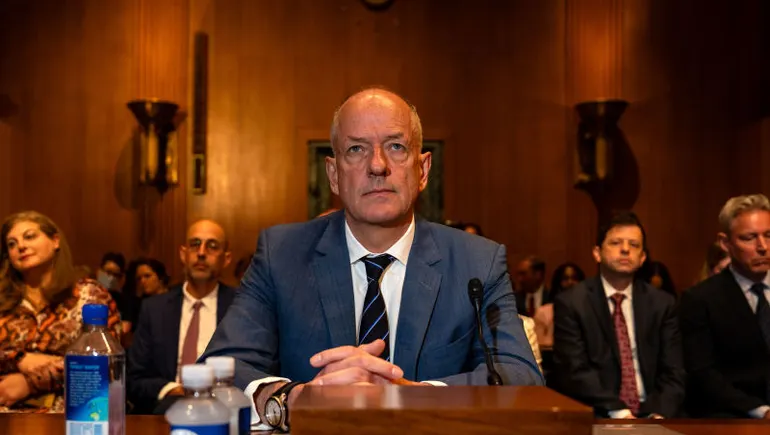Dive Brief:
Andrew Witty is stepping down as chief executive officer of UnitedHealth, citing personal reasons, the healthcare giant announced Tuesday.
Witty, who has run UnitedHealth since 2021, is departing following a sharp downturn in the company’s financial performance from higher medical spending and unfavorable policy changes. He will be replaced effective immediately by Stephen Hemsley, the chairman of UnitedHealth’s board and its CEO from 2006 to 2017.
UnitedHealth also suspended its 2025 guidance on Tuesday, pointing to the ongoing increase in medical care activity. The company’s stock fell more than 10% in premarket trading Tuesday following the news.
Dive Insight:
UnitedHealth is the largest healthcare company in the U.S., operating the biggest private health insurer, a major pharmacy benefit manager, a sweeping physician network, a health tech business and more. The company brought in record revenue in 2024, despite a string of operating challenges like elevated utilization among members in Medicare Advantage plans — and scrutiny of its business practices that intensified following the killing of its top payer executive in December.
But UnitedHealth had a rough start to 2025 due to unexpectedly high costs for its insurance and value-based care units — a sharp departure from its peers, which reported medical spending was under control in the first quarter.
UnitedHealth slashed its profit guidance for 2025 by almost 12% following its results in mid-April. The company has lost nearly $190 billion in market capitalization since.
Now, UnitedHealth is pulling its 2025 guide altogether. Care activity is continuing to accelerate and is broadening to more types of benefit offerings than in the first quarter, the company said.
Also, medical costs for new MA beneficiaries that joined its Optum Health care delivery business this year remain higher than expected, according to UnitedHealth.
Despite UnitedHealth’s business challenges, the departure of Witty, who joined UnitedHealth after running drugmaker GlaxoSmithKline, was unexpected. Over the executive’s four-year tenure, UnitedHealth grew from $257.1 billion to $400 billion in annual revenue, and the company consistently outperformed investors’ expectations.
Witty was well rewarded for those efforts, bringing in $26.3 million in compensation in 2024, making him one of the highest-paid CEOs in healthcare.
Now, Witty is being replaced by Hemsley, who will remain UnitedHealth’s chairman along with assuming the CEO post.
“This morning’s CEO transition doesn’t strike us terribly surprising in light of recent business developments and deterioration in investor trust,” Leerink Partners analyst Whit Mayo wrote in a note on Tuesday. “The suspension of the 2025 guide due to a continuation of excessively high care activity is more concerning.”
A spokesperson for UnitedHealth declined to elaborate on the reasons behind Witty’s departure.
Hemsley joined UnitedHealth as chief operating officer in 1997 before becoming president in 1999, CEO in 2006 and board chair in 2017.
Witty will stay on as a senior adviser to Hemsley. The new CEO, who is 72, will have to shepherd the company through its ongoing operational and public relations challenges like runaway medical spending, sharp consumer distrust, reverberations from a massive cyberattack on its Change Healthcare subsidiary, lawmaker scrutiny and several Justice Department investigations of its practices.
“Hemsley is one of the most qualified candidates to serve as [UnitedHealth’s] CEO,” J.P. Morgan analyst Lisa Gill wrote in a Tuesday note. “Hemsley built the modern integrated [UnitedHealth] and has been involved as Chairman of the Board ever since.”
In a statement, Hemsley said the company is “grateful” for Witty’s leadership, “especially during some of the most challenging times any company has ever faced.”
He added that the company has “tremendous opportunities to grow as we continue to help improve health care and to perform to our potential — and, in so doing, return to our long-term growth objective of 13 to 16 percent.”


